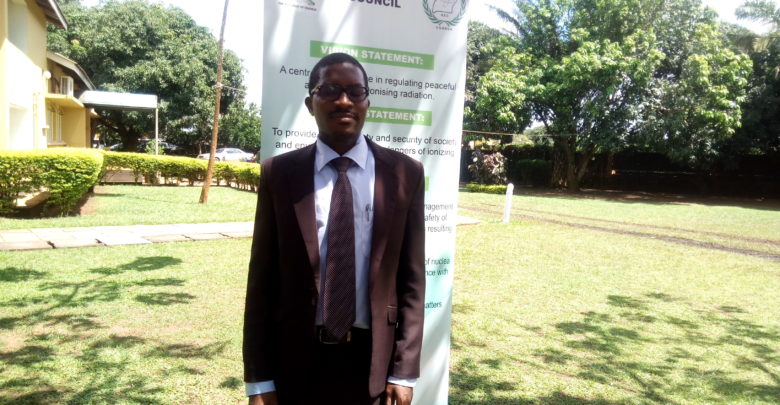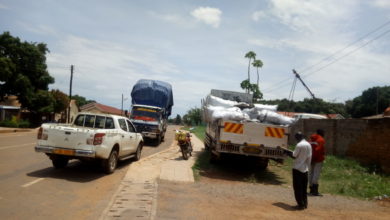
Global Politics
UGANDA: UGANDA ATOMIC ENERGY COUNCIL WANTS TO INSTITUTING NUCLEAR SECURITY MEASURE IN FACILITIES TO STOP RADIATION THAT IS FRONT FOR CAUSING CANCER.
The Atomic Energy Inspection of Radiation Facilities to provide on overview of the inspection policy of radiation facilities by atomic energy council.
GULU-UGANDA: Natharius Nimbashabira the senior protection officer of Atomic Energy Council says, legal provision framework section 9 (1) (b) empower A.E.C Act to conduct inspections to access radiation safety.
The AEC is not carrying out inspection only in Uganda, but security conditions and compliance with the provisions of the Act and regulations and other requirements specific in an authorization in Ghana and Nigeria too.
Nimbashabira made the statement during Atomic Energy Council which organized to create awareness with Atomic Energy in Gulu, Bomah Hotel on Thursday and Friday last week.
He says any person who knowing and without reasonable excuse in any other manner obstructs a radiation protection officer, in the course of performing his or her function under this Act commits an offence, and is liable on conviction to imprisonment not exceeding four years without the option of the fine (Sec. 63 (3))
Nimbashabira stress that the responsibilities of authorized person in the inspection process, allow inspectors unlimited access to premises, and support the radiation workers and RSQs in the preparation for inspections.
A case in point, records are maintained and are available for inspection, the radiation personnel and briefing before prepare for inspection.
He outline to provide a conducive atmosphere for the inspectors and ensuring safety and security of council inspection from radiation and non-radiation (chemical biological, electrical and many others) hazards.
Thus, to oversee the implementation of inspection requirements and recommendations-provide resources, and provide feedback to council on the implementation status of the inspection requirements and recommendations.
Enforcement of requirements
Nimbashabira reveals that section 9(1) (e)of the Act mandates Council to take such action as is necessary to enforce the requirements of the act and of any regulations or authorizations.
“Regulation 11 of Atomic Energy Regulations, 2012 mandates Council to impose fines or direct closure or undertakes an action for locking the premises for non-compliance with the regulations and any other requirements commensurate with the nature of violation.
He says the types of enforcements includes the following action, verbal warning, written warnings-issues of immediate action order, inspection reports and closure of premises or equipment as well as legal redress, he warns.
Post inspection actions
He argues that actions includes address issues of immediate action as stated in the order by inspectors and explained during the exist briefing.
And upon receipt of inspection report, address all inspection requirement and recommendation within the indicated time frame. Inform Council of the implementation status for verification, he reasoned.
Thus, where diffulties are encountered in the interpretation of the requirements and recommendations, contact Council for guidance, said.
He warns that critical violations will lead to instant suspicion of radiology services, using a faulty machine, inadequate shielding of premises, inadequate radiation personnel, lack of occupational monitoring of workers, operating without authorization, repetitive violation and unqualified exposures that is wrong purpose.
Major observation during inspection process interlia no feedback from facilities offer inspection, some facilities deny inspectors access, sometimes too much waiting time for inspectors, some imaging centers have opened primarily for business as opposed to offer the services.
This the first edition of Atomic Energy Council of Uganda story, on Thursday this week we are coming with the second edition.
Authorization of facilities registration of sources
Sekyanzi Deo Senior Head of Protection Officer Atomic EnergyCouncil says section 32 of the Act “No practice without authorization (1) subject to section 33 does not allow such deed to happened.
He further argues that no person shall acquire, own possess, operate, export, hire loan, receive, use, install, decommission, transport, store, sell distribute, dispose of, transfer, modify, upgrade, manufacture of undertake any practice to application of atomic energy and regulated by this Act, unless permitted by an authorization issued under the Act.
Sekyanzi Deo says they have register facilities 420 in total including 359 medical facilities, 24 industrial, 28 security related, analytical laboroty, 4 researches center 2 transport facilities, 7 suppliers. And 172 radioactive sources, 175 radiation Generators confirm with Atomic Energy Council position.
In the second edition Oyeng Yeng News will bring for our readers second edition of Atomic Energy Council story.
UGANDA: UGANDA ATOMIC ENERGY COUNCIL WANTS TO INSTITUTING NUCLEAR SECRUITY MEASURE IN FACILITIES TO STOP RIADIATION THAT IS FRONT FOR CAUSING CANCER.
The Atomic Energy Inspection of Radiation Facilities to provide on overview of the inspection policy of radiation facilities by atomic energy council.
GULU-UGANDA: Natharius Nimbashabira the senior protection officer of Atomic Energy Council says, legal provision framework section 9 (1) (b) empower AEC Act to conduct inspections to access radiation safety.
The AEC is not carrying out inspection only in Uganda, but security conditions and compliance with the provisions of the Act and regulations and other requirements specific in an authorization in Ghana and Nigeria too.
Nimbashabira made the statement during Atomic Energy Council which organized to create awareness with Atomic Energy in Gulu, Bomah Hotel on Thursday and Friday last week.
He says any person who knowing and without reasonable excuse in any other manner obstructs a radiation protection officer, in the course of performing his or her function under this Act commits an offence, and is liable on conviction to imprisonment not exceeding four years without the option of the fine (Sec. 63 (3))
Nimbashabira stress that the responsibilities of authorized person in the inspection process, allow inspectors unlilimited access to premises, and support the radiation workers and RSQs in the preparation for inspections.
A case in point, records are maintained and are available for inspection, the radiation personnel and briefing before prepare for inspection.
He outline to provide a conducive atmosphere for the inspectors and ensuring safety and security of council inspection from radiation and non-radiation (chemical biological, electrical and many others) hazards.
Thus, to oversee the implementation of inspection requirements and recommendations-provide resources, and provide feedback to council on the implementation status of the inspection requirements and recommendations.
Enforcement of requirements
Nimbashabira reveals that section 9(1) (e)of the Act mandates Council to take such action as is necessary to enforce the requirements of the act and of any regulations or authorizations.
“Regulation 11 of Atomic Energy Regulations, 2012 mandates Council to impose fines or direct closure or undertakes an action for locking the premises for non-compliance with the regulations and any other requirements commensurate with the nature of violation.
He says the types of enforcements includes the following action, verbal warning, written warnings-issues of immediate action order, inspection reports and closure of premises or equipment as well as legal redress, he warns.
Post inspection actions
He argues that actions includes address issues of immediate action as stated in the order by inspectors and explained during the exist briefing.
And upon receipt of inspection report, address all inspection requirement and recommendation within the indicated time frame. Inform Council of the implementation status for verification, he reasoned.
Thus, where diffulties are encountered in the interpretation of the requirements and recommendations, contact Council for guidance, said.
He warns that critical violations will lead to instant suspicion of radiology services, using a faulty machine, inadequate shielding of premises, inadequate radiation personnel, lack of occupational monitoring of workers, operating without authorization, repetitive violation and unqualified exposures that is wrong purpose.
Major observation during inspection process interalia no feedback from facilities offer inspection, some facilities deny inspectors access, sometimes too much waiting time for inspectors, some imaging centers have opened primarily for business as opposed to offer the services.
This the first edition of Atomic Energy Council of Uganda story, on Thursday this week we are coming with the second edition.
Authorization of facilities registration of sources
Sekyanzi Deo Senior Head of Protection Officer Atomic Energy Council says section 32 of the Act “No practice without authorization (1) subject to section 33 does not allow such deed to happened.
He further argues that no person shall acquire, own possess, operate, export, hire loan, receive, use, install, decommission, transport, store, sell distribute, dispose of, transfer, modify, upgrade, manufacture of undertake any practice to application of atomic energy and regulated by this Act, unless permitted by an authorization issued under the Act.
Sekyanzi Deo says they have register facilities 420 in total including 359 medical facilities, 24 industrial, 28 security related, analytical laboroty, 4 researches center 2 transport facilities, 7 suppliers. And 172 radioactive sources, 175 radiation Generators confirm with Atomic Energy Council position.
In the second edition Oyeng Yeng News will bring for our readers second edition of Atomic Energy Council story.





